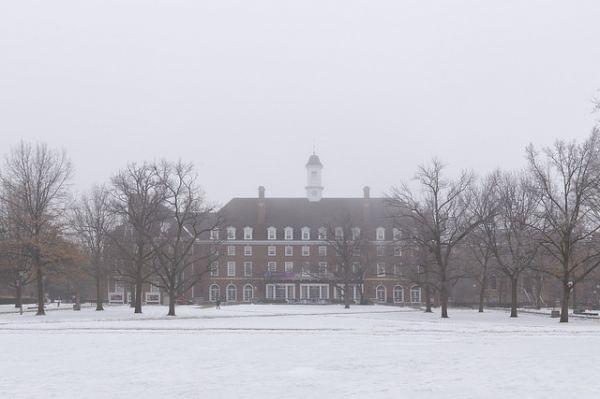U of I Touts Sexual Harassment Reforms, Implementation Still Unclear

The Illini Union in winter at the University of Illinois at Urbana-Champaign. Travis Stansel/Illinois Public Media
In the midst of the #MeToo movement and several high-profile sexual misconduct cases involving its own faculty, the University of Illinois is announcing recently released recommendations that would change how the university handles cases of sexual harassment and misconduct. Recommendations include prohibiting confidentiality agreements that keep findings of misconduct secret, and a system for tracking and disclosing findings of misconduct on a "need-to-know" basis.
On Thursday, the university’s Board of Trustees, meeting in Chicago, voted to support proposals just released from a system-wide task force that reviewed prevention of and responses to sexual misconduct. There is no timeline for implementation.
“Policies are complex things, and they need to be crafted and drafted in the right way. And we'll be working on terms and defining concepts and all of that sort of thing,” said Barbara Wilson, vice president for academic affairs who chaired the task force. “And then we'll vet those amongst various stakeholder groups and put them into place.”
The task force was formed a year ago, in the wake of a scandal involving law professor Jay Kesan, who had been accused of sexual harassment and later admitted to it. An investigation involving dozens of witnesses and multiple complainants that found him in violation of policy had not been publicly addressed until an audience member at a #MeToo forum asked what was being done to protect students.
In the year that followed, news outlets have uncovered several other cases where professors accused of sexual harassment were put on paid leave and/or quietly resigned. As an NPR Illinois-ProPublica investigation detailed, some were given non-disclosure agreements, where the university promised not to disclose the reasons for departures of those found to have violated policy after being accused of sexual misconduct.
The new recommendations address some of these practices. The committee, which focused on policy for all three campuses, suggests the university adopt a system-wide policy for resignation and separation agreements that “generally prohibits the inclusion of confidentiality or non-disclosure provisions that would limit the release of findings of sexual misconduct.” The recommendations lay out an exception for cases where non-disclosure would be “necessary for the benefit of the victim of harassment.”
The report also suggests guidelines for disclosing certain information about completed investigations, “with explicit attention to the privacy, safety, and well-being of complainants.” It calls for each campus, in Springfield, Chicago and Urbana-Champaign, to keep data on investigations and produce regular releases of information that are easy to understand.
The report calls for a change in culture – one “that allows all members of our university communities to learn, study, explore, and work in spaces that are free from sexual misconduct.”
“It's our belief that we're going to solve these issues through education and training, not through punishment and policies, although we need those too,” said Wilson.
This system-wide effort was in concert with the University of Illinois at Urbana-Champaign’s efforts: two committees looking at faculty sexual misconduct and faculty-student relationships. Both also released their reports in recent weeks.
The committee on faculty misconduct recommended expanding the definition of sexual harassment beyond the campus’ current standard, hiring more victims’ advocates and investigators, and asking candidates for university jobs to waive confidentiality and reveal their disciplinary records. The push for disclosure of disciplinary records is echoed in the system-wide recommendations.
Earlier this week, a task force focused on “consensual relationship policy” released recommendations that would largely prohibit romantic relationships between faculty and students.
Lesley Wexler, a law professor and associate dean at the UIUC College of Law, served on the task force. She said allowing student-faculty relationships can be "destructive for students who receive the message that they’re not just there for their education."
“It’s easier to take action when it's backed up with clear enforceable policy,” she said.
"Even in a setting where a sexual advance might not be unwanted by a student the relationship can still be problematic," she said, speaking about her own opinion on the matter.
The timeline and cost of implementation of the proposals are still unclear.
University of Illinois at Urbana-Champaign leadership has said they’re working with stakeholders to consider implementation and revisions of the reforms suggested by its campus committees.
Here are the reports in their entirety:
UIUC Consensual Relationship Policy Task Force
UIUC Committee on Faculty Sexual Misconduct
University of Illinois System Task Force on Sexual Misconduct Prevention & Response
Links
- U Of I Committee Urges Changes To Sexual Harassment Policies, But No Timeline For Adoption
- Researcher: Sexual Harassment Just The ‘Tip Of The Iceberg’
- Ex-UI Administrator Fired From University Of Tennessee After Sexual Harassment Case Made Public
- Documents Show Sexual Harassment Allegations Against Jay Kesan Date Back To 2002
- U Of I Law School Dean Apologizes For Sexual Harassment Case Involving Professor Jay Kesan
- U Of I Law Students Demand Resignation Of Professor Accused Of Sexual Harassment
- U Of I Law Professor Accused Of Sexual Harassment, Found In Violation Of Campus Code Of Conduct
